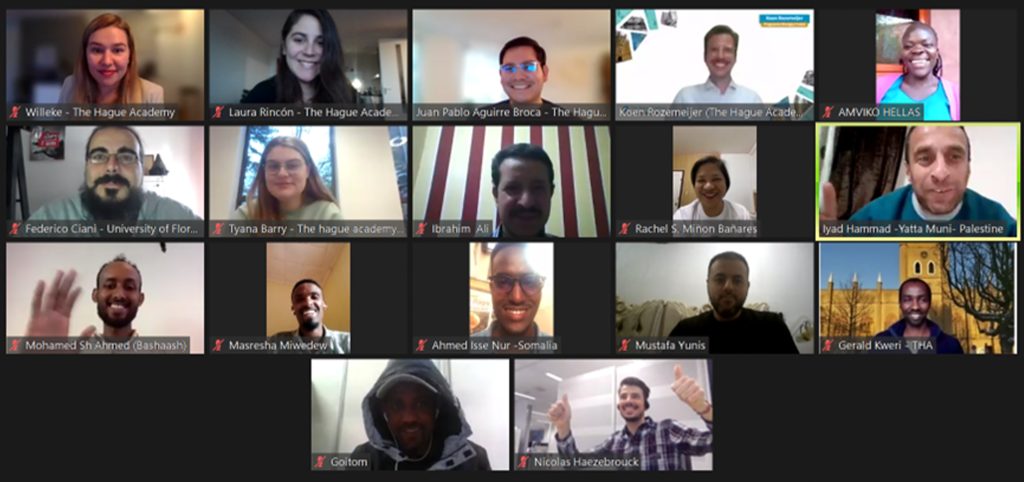Many of our alumni work on disability inclusion in their communities, and they all have interesting experiences to share. In some countries, policies do exist but need to be better adapted to the real needs of persons with disabilities. In other countries, policies do not exist at all, and data gathering for advocacy and awareness raising is the first priority. Our second Alumni Network event offered our alumni an opportunity to exchange experiences, concerns and best practices.

On November 17th, our alumni network gathered online for the second time this year around a topic prevalent among their and The Hague Academy’s work. Alumni from Belgium to Zambia and Ghana to The Philippines came together to speak of the need for further inclusion in local governments, particularly for persons with disabilities.
The attention they deserve
Our programme manager Koen Rozemeijer opened the event with the observation that persons with disabilities are still too often overlooked in development. According to the World Health Organisation, 1.3 billion people – 16% of the global population – experience a significant disability today. Despite this, persons with disabilities are left out of policies and initiatives that do not take their needs into account. So, while development programmes aim to be inclusive, it is the most vulnerable that are too often left out.
It is hopeful, though, that people across the globe, including our alumni, are making strides in mainstreaming the inclusion of persons with disabilities in not just the development sector but all areas of life. The We Are Able! Programme, implemented by a consortium of organisations which includes The Hague Academy, seeks to empower persons with disabilities at the local level, promoting their representation and providing both them and local governments with the tools to design inclusive communities. On the global level, governments and organisations have declared the 3rd of December the annual day for Persons with Disabilities, dedicating the day to bringing awareness to the rights and well-being of persons with disabilities in all aspects of political, social, economic, and cultural life. As Hellas Marithas from Uganda exclaimed: “This is now a global agenda. Persons with disabilities are left out. We cannot talk about development and change without being inclusive. We cannot neglect people. We are finally understanding this”.
Peter Leley, an alumnus from Kenya, through his work at the Kenya Institute for Public Policy Research and Analysis, works on simultaneous interventions in education, health, social protection, and labour.
Existing policies and guidelines need to be accessible
Hellas is a co-trainer for the We are Able! Programme and implements training activities for public authorities at local levels in northern Uganda. As she explained, one of the biggest challenges in Uganda is that while policies exist, specifically through the 2020 Persons with Disabilities Act, they are not accessible to the people they target.
Take support for those with hearing disabilities, for example. Policy and support information is available through text and channels that use International Sign language to take into account lower literacy rates in impoverished, marginalised communities. While considerate, many in the communities Hellas works in do not speak International Sign Language – they have developed their own language system out of necessity. Therefore, policy information is still not tailored to reach the audience it intends.
To Hellas, this highlights the need for policy communication and more thoughtful implementation in local communities. One of the most powerful tools we can have is knowledge and advocacy, and as her work reflects, one of the first steps is to share the tools with the people that need to use them.
Data are a powerful tool for advocacy
Sandy El Yammouni is a Geographic Information System technician in Lebanon. As opposed to Uganda, Lebanon does not have an explicit legal framework to support persons with disabilities: “We do not have supporting laws for persons with disability. This is the main problem – the root of the problem”.
To address the problem, Sandy works with eight municipalities to collect data on accessibility, mobility, and the opportunities present for people with disabilities in her region. She is looking to qualify and quantify what persons with disabilities need. In a situation where the needs of persons with disabilities are systematically overlooked, she believes that collecting and presenting data makes their plight visible and easier to understand.
As Sandy explained, data gathering is an immense tool for not just policy creation, but also advocacy. She hopes that with the data she gathered, she can apply for international funding. Eventually, the data that she and her colleagues collect can serve as the basis for a tailored and inclusive policy structure for persons with disabilities in Lebanon.
Connect with us!
Find the full recording of the webinar here. Are you interested in learning more about our courses? Find them on our website!
